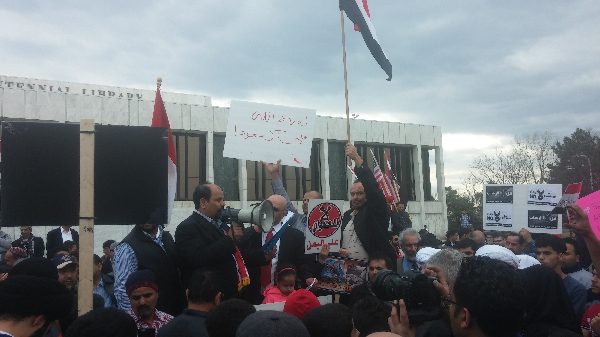
DEARBORN — Hundreds of Arab Americans gathered in front of Dearborn’s Henry Ford Centennial Library on Sunday to protest against the Saudi-led military intervention in Yemen. The demonstrators, who were mostly Yemeni, chanted and held signs condemning the rulers of Saudi Arabia and called for unity and dialogue in their homeland.
On March 26, an alliance of Arab nations led by Saudi Arabia began dropping bombs targeting Houthi forces, which have taken over most of the country. The Houthis, who are Shi’a in the mostly Sunni country, are allied with former President Ali Abdullah Saleh.
Houthi militants captured the capital Sanaa last September and kept advancing in different provinces until they launched an offensive against the southern city of Aden, where President Abdrabboh Mansur Hadi had relocated. Saudi Arabia started a bombing campaign dubbed “Operation Decisive Storm” to quell their advance.
The protesters in Dearborn held up graphic images of Yemeni children who died from the Saudi-led shelling.
The organizers of the protest, who identified themselves as community activists and civic leaders, issued a statement demanding a free, independent and peaceful Yemen.
“We condemn in the strongest possible terms the illegal and atrocious acts of military aggression by foreign governments on Yemen’s people, land and infrastructure,” the statement reads, referring to the Saudi-led bombing campaign. “This ongoing aggression has spilled the blood of thousand of Yemenis, caused untold human suffering, destroyed much of the country’s infrastructure and made a political solution to the crisis more difficult.”
The statement demands a purely political solution to the crisis and calls on the White House and Congress “to do everything they can politically to stop the illegal military aggression in Yemen.”
The protesters chanted against the Saudi monarchy, calling the Saudi King Salman a coward. A protestor held a sign that read, “Stop Wahabi terrorism”, referring to the ultraconservative brand of Islam that Saudi Arabia follows, which is ideologically linked to violent jihadism. Another sign said, “Curse Al Saud”, the royal family of Saudi Arabia.
Several speakers from the Yemeni community took the podium to call for an end to the Saudi offensive.
Yemeni American activist Wali Altahif described the Saudi military campaign as a genocide. “They’re bombing schools, hospitals and killing innocent civilians,” he said.
Activist Walid Fedama introduced speaker Aydarous Almehdar, pointing that he is from the southern province of Hadramout.
“Our demonstration is not only of northern Yemenis, but at the end of the day, we are all one people,” Fedama said, in an implied response to community leader Ali Baleed Almaklani, who told The Arab American News last week that the organizers of the protest do not represent all Yemenis.
“Yemenis are one people,” the demonstrators chanted in welcoming Almehdar.
Almehdar criticized the Saudi intervention and called for peace and dialogue. Speaking to The Arab American News, the activist acknowledged that southern Yemenis were victims of discrimination by Saleh’s regime, but played down the alliance between Houthi forces and the former president.
“Saleh is irrelevant right now,” he said. “Saleh waged six wars against the Houthis, who never participated in oppressing southern Yemenis.”
Almehdar added that southerners are among the poorest segments of the population and feel frustrated by the recent events.
Journalist and U.S. Navy veteran Brian Stone said American foreign policy should focus on peace and humanitarian aid to the civilian population.
“All the destruction of the Arab World stems from Saudi Arabia,” said Yemeni American protester Fadel Aljahmi. “From Yemen to Lebanon to Syria to Iraq to Libya, the Saudi royal family is destabilizing the region. I am not talking about the Saudi people; they are oppressed by their government.”
Asked about Yemeni Americans who support the Saudi intervention in their homeland, Aljahmi said, “If they are mercenaries who support the Saudi, Egyptian, Moroccan, Pakistani and even Sudanese planes bombing their country, they are entitled to their own opinions; it is their freedom of speech.”
Khaled Alsuraymi acknowledged that there had been infighting in Yemen before the Saudi offensive, but said foreign military intervention will contribute to the problem not the solution.
“This aggression is criminal,” he said. “It will only make matters more complicated. We call on all parties to engage in dialogue to end the crisis.”
Alsuraymi added that destabilizing Yemen is counterproductive to Saudi Arabia. He said if chaos starts in Yemen, it will spread to neighboring Gulf monarchies.






Leave a Reply